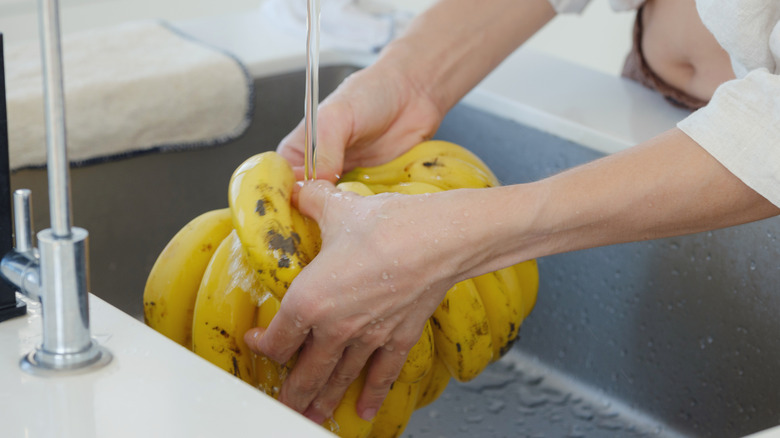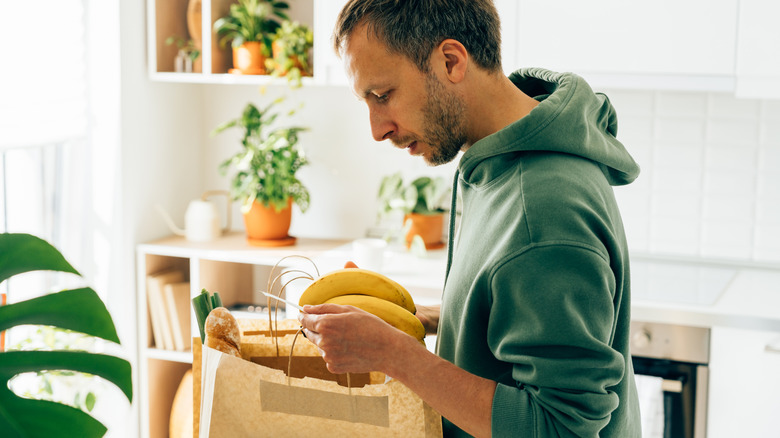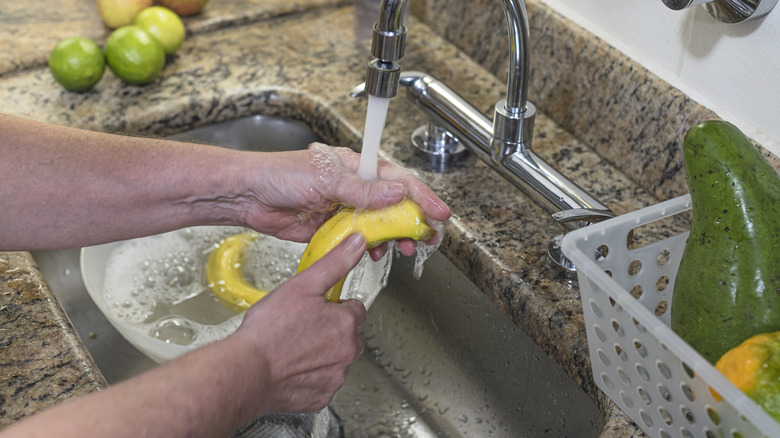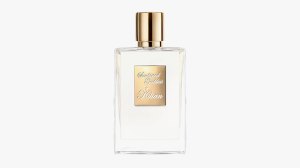
Santiaga/Getty Images
There’s no monkeying around when it comes to whether or not you should wash bananas before storing them in your kitchen. Unless you like courting a host of insects or a bout of belly-busting bacteria, you should probably give your next yellow bunch a nice bath.
This may come as a surprise to you, even if you’re accustomed to washing other produce. After all, banana peels appear to protect the flesh inside them pretty well. But it turns out that looks can be deceiving, so rinse off those bananas for a couple of important reasons. The first is to minimize your chance of a fruit fly infestation. Fruit flies find certain scents appealing, including sweet ones, which is why they’re drawn to fruity plants, and particularly bananas.
Entomologist Dr. Daniel Kiefer explained why this is a problem for consumers in an interview for Better Homes and Gardens. “Fruit flies are attracted to bananas because of their strong smell, along with the yeasts and bacteria that can grow on ripe fruit. Fruit flies commonly lay eggs on bananas,” he says. In other words, if you neglect to rinse your bananas, you could end up with a swarm of fruit flies in your house, because banana peels are among the places where fruit flies commonly lay eggs.
Washing banana peels can help prevent fruit fly problems

Natalia Gdovskaia/Getty Images
Fruit flies can take as little as about a week to mature from egg to adult. Once they get older, the females will continue to reproduce hundreds of times. However, you can stop this cycle by sending eggs down your drain and out of your life.
Unintentionally inviting fruit flies home is perhaps the grossest of the reasons to give your bananas a shower after your next shopping trip. That said, if you eat one, it’s not the end of the world, according to horticulture expert Dr. David Lowenstein, who shared (via Self) that if you accidentally chow down on fruit fly eggs or maggots, “you’re getting a really small amount of protein.” (Read more about what happens to your body when you accidentally swallow a bug.)
That said, fruit fly houseguests aren’t the only important reason to wash your bananas under tap water. The peels of the bananas you bought may have been exposed to pesticides you’d rather not eat. Although the pesticide shouldn’t get into the banana flesh, it could possibly be transferred during peeling or cutting (since some people like to cut whole bananas in half before peeling.)
Washing bananas can get rid of pathogenic substances

Marcosmartinezsanchez/Getty Images
Of course, if you’re someone who eats banana peels (yes, they’re nutritionally fair game, although their taste and texture may be a turn-off), you almost certainly want to wash them first. As registered dietitian and clinical dietary nutritionist Toby Amidor explained (via Food Network): “They can be contaminated with dirt, microorganisms (like bacteria) or fertilizer.” This is particularly relevant if you’re trying to eliminate exposure to herbicides, pesticides, and the like. A 2020 review in Ecotoxicology and Environmental Safety determined that the amount of post-harvest residual pesticide on banana peels and pulp may be unhealthy.
According to the U.S. Food and Drug Administration, nearly 48 million individuals experience food poisoning annually, and some cases are the result of germs that travel on plants. Though the agency doesn’t specifically mention bananas, it suggests that all produce be washed thoroughly with non-soapy water to lower the risk of consuming contaminated foods. And remember that you can always use your banana peels to reduce inflammation under your eyes if you want.
Credit: healthdigest.com










